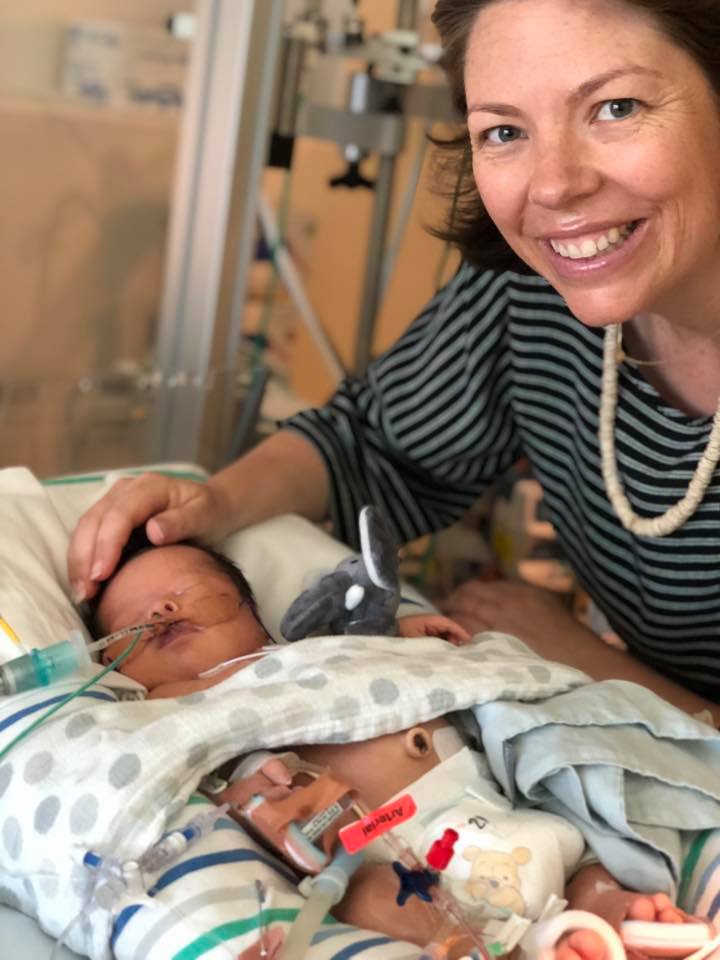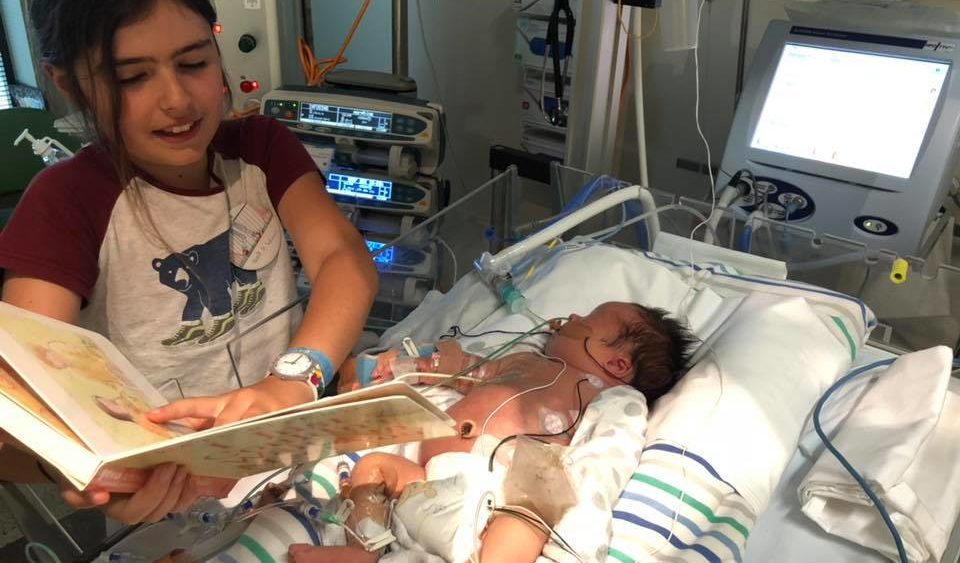Four weeks after giving birth to a Down syndrome baby, Alison Preston wants to tell the world how much joy he has brought to her family.
Alison says her three older children – two girls aged nine and seven, and a four-year-old boy – just adore their baby brother, Ethan.
“He is such a joy – he is a beautiful boy,” she says. “He is so like his siblings and they adore him and he’s just so sweet.”
Alison confesses that she went through a period of grieving after finding out early in her pregnancy that her fourth baby was likely to have Down syndrome. As she said goodbye to the baby she had imagined coming into the family, she experienced a deep sense of peace after prayer and reflection.
“I know my journey isn’t a journey that everyone has, but I have had a deep sense of God’s peace, that peace beyond understanding, from very soon after learning of the diagnosis. I know that is from God,” says Alison. “I think it is a gift of God and I’m thankful for it.”
Alison took the unusual step for a Christian of having prenatal screening because she knew that, at age 41, she faced a high risk of having a baby with health issues such as Down syndrome.
“My thinking was ‘let’s find out and then the health professionals can care for myself and the baby the best as possible.’
“That seemed to be quite an unusual approach, but it proved to be a good one because my GP was really respectful. She referred me to a well-trained genetic counsellor because she was aware of the high risk, and that woman was very kind and neutral in the way she shared the news. She accepted my decision in a very straightforward way.
“I have read a lot of stories of people feeling pressured to make different decisions to what I made but that wasn’t my experience.”
“I spent a lot of time in prayerful reflection, thinking through a lot of things and offering it to God.” – Alison Preston
Alison and her husband, Paul Scoullar, were immediately of one mind in deciding to go ahead with the pregnancy. They believe strongly that all people are made in the image of God.
“I work in international community development and emergency response, so much of my vocation and my world is around upholding the dignity of all people whoever they are,” Alison says.
“Psalm 139 has always been really significant for me, that sense of being known by God and created from the earliest days. So, all that came together very quickly to give us a sense of clarity and confidence about how to move forward and I’m very thankful of that.”

Alison Preston with Ethan
Alison soon realised that, unlike parents in developing countries, she and Paul were well equipped to enable their baby to flourish. They have a supportive family and church community, as well as access to world-class health and education specialists, in their home city of Melbourne.
“It was at times upsetting when the response people had to us was ‘I’m sorry’.” – Alison Preston
“Part of the benefit of the early screening was I had a lot of time to read and prepare and learn. I spent a lot of time in prayerful reflection, thinking through a lot of things and offering it to God,” she says.
As the pregnancy progressed, Alison found it hurtful when people said “I’m sorry” when she told them the news.
“It was at times upsetting when the response people had to us was ‘I’m sorry’ because, by then … we’d adjusted our perspective, we’d grieved the child we’d imagined we were having. And then once we’d adjusted and done our own work around this child [being] as much made in the image of God as any of our other children, to then have people say ‘I’m sorry’ was difficult. But I also could understand that that was them processing themselves.”
The most helpful reactions, she says, were when people said: “’thank you for sharing that, how are you feeling about things?’ Just holding the thing and acknowledging that it’s significant but not making a judgment.”
Another experience Alison found painful before the birth was how medical staff, when introducing her to people, always mentioned the fact she was continuing with the pregnancy.
“It was distressing to realise how few parents in Australia, and particularly in Europe, choose to continue once they have a diagnosis. That surprised me and distresses me,” she says.
“Paul and I did spend some time looking at that and it was distressing to realise how few parents choose to accept a child with a disability of some kind and how that has become more and more the norm in a medical frame.
“I think there is a lot of work to be done in that space about upholding the dignity of people with disabilities and enabling parents to understand that there is so much joy in children and that there is a lot of support available.”
“Children are so wonderfully resilient and matter-of-fact.” – Alison Preston
Alison and Paul took their time breaking the news to their three other children because they didn’t want them to be anxious. But they found them very “embracing.”
“We said, ‘our little baby might be a bit different and a bit slow to talk or walk.’ My seven-year-old was just so beautiful; she said to me, ‘oh, but mum, all kids are different.’
“We had been a bit anxious thinking about how to prepare them, what would this mean for them, but actually children are so wonderfully resilient and matter-of-fact.
“Once he arrived they said ‘oh, he’s just like any baby.’”
Unfortunately, Ethan has had a tough introduction to life, spending his first four weeks in the neonatal intensive care suite at the Royal Children’s Hospital Hospital in Melbourne.
“Those three things that we hope for Ethan are what we hope for our other children. It’s been quite clarifying.” – Alison Preston
“We found out in pregnancy that he had a significant heart defect that will need surgery, hopefully at three months,” she says.
“We hoped that we might be able to take him home after the birth until the heart surgery at three months, but that wasn’t to be – he needed immediate healthcare and it’s been lifesaving healthcare that he’s had.”
Alison says it was very helpful to see a Christian psychologist to talk through some of her fears, such as what the impact might be on their other children, and what it would mean for her professionally.
“[Down syndrome] is a huge spectrum and things become evident over time. Some of the things are clear immediately, like do they have a heart defect or not, but things like the level of developmental delay or intellectual disability becomes apparent over time,” she says.
“Also, I know that we will work with fantastic speech therapists, and physios and enable him the best we can, but that’s a different experience with what we’ve had with our other children.”
Alison says they chose the name Ethan because in Hebrew it means strong and optimistic and standing firm. Asked what her hopes are for him, she replies: “that he knows that he is deeply loved by God and he is created in the image of God himself, and I have a great deal of confidence that he will know that he is loved by our family and that he’s accepted for who he is.
“I also hope he is able to really flourish in who he is … It’s been a good process of thinking about what’s really important. Those three things that we hope for Ethan are what we hope for our other children. It’s been quite clarifying.”
When her 12 months of maternity leave finish, Alison does expect to go back to her job with Anglican Overseas Aid, working with partners in Kenya and Gaza and the Pacific.
“Paul and I spend a lot of time in developing countries and that was a very significant foundation for understanding how equipped we are to care for our son because we know how many children in the world live and the [limited] opportunities they have for healthcare.
“He’s opening a whole new world for me.” – Alison Preston
“We had a very distinct understanding of the privilege and blessing of being in Melbourne. This little fellow, the sort of issues he’s had in the last month, he wouldn’t have survived in many, many parts of the world, so we’re so thankful. It’s very clarifying when you realise how few places in the world would have been able to save our son.”
Alison says her dream is to take Ethan with her to Kenya, as she has taken the other children.
“And I know my experience with him will open my eyes even more to the challenges that people with disabilities face in developing countries.
“I already have some understanding of that, but he’s opening a whole new world for me.
“I also look forward to thinking a lot more about what it means to be created in the image of God for someone with a disability, and what does it tell us about God.”


